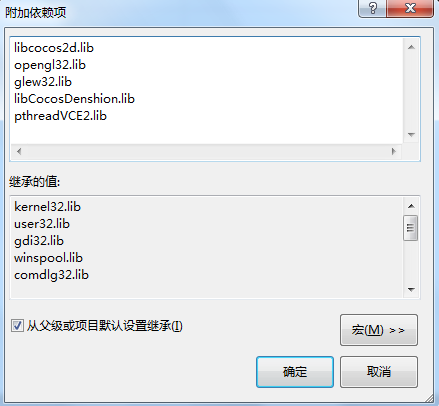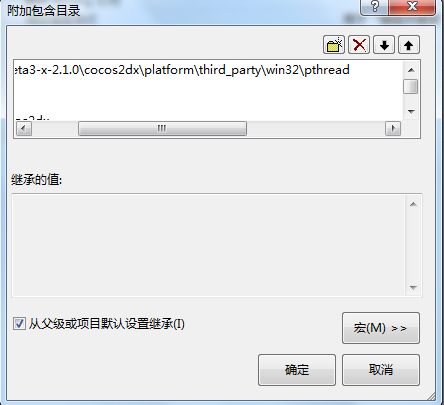cocos2dx多執行緒以及執行緒同步 與 cocos2dx記憶體管理與多執行緒問題
阿新 • • 發佈:2019-01-26
ocos2d-x引擎在內部實現了一個龐大的主迴圈,每幀之間更新介面,如果耗時的操作放到了主執行緒中,遊戲的介面就會卡,這是不能容忍的,遊戲最基本的條件就是流暢性,這就是為什麼遊戲開發選擇C++的原因。另外現在雙核手機和四核手機越來越普遍了,是時候使用多執行緒來挖掘硬體的潛力了。
在HelloWorldScene.h檔案中
原始檔如下
可以看到,將Student的指標傳遞給了pidrun執行緒,那麼在pidrun執行緒中獲得Student資訊如下:
1.環境搭建
cocos2d-x中的多執行緒使用pthread就可以實現跨平臺,而且也不是很難理解。使用pthread需要先配置一下工程。右擊工程----->屬性----->配置屬性---->連結器----->輸入---->附加依賴項中新增pthreadVCE2.lib,如下圖
接著新增附加包含目錄,右擊專案,屬性----->C/C++---->常規----->附加包含目錄加入pthread標頭檔案所在的目錄
這樣,環境就搭建起來了。
2.多執行緒的使用
使用pthread來實現多執行緒,最重要的一個函式是
- PTW32_DLLPORT int PTW32_CDECL pthread_create (pthread_t * tid,//執行緒的標示
- const pthread_attr_t * attr, //建立執行緒的引數
- void *(*start) (void *), //入口函式的指標
-
void*arg); //傳遞給執行緒的資料
- PTW32_DLLPORT int PTW32_CDECL pthread_create (pthread_t * tid,//執行緒的標示
- const pthread_attr_t * attr, //建立執行緒的引數
- void *(*start) (void *), //入口函式的指標
-
void *arg); //傳遞給執行緒的資料
在HelloWorldScene.h檔案中
- pthread_t pidrun,pidgo;
- static void* th_run(void *r);
- static void* th_go(void *r);
- pthread_t pidrun,pidgo;
- staticvoid* th_run(void *r);
- staticvoid* th_go(void *r);
然後自定義了一個類,用於給執行緒傳遞資料。Student類如下:
- #pragma once
- #include <string>
- class Student
- {
- public:
- Student(void);
- Student(std::string name,int age,std::string sex);
- ~Student(void);
- std::string name;
- int age;
- std::string sex;
- };
- #pragma once
- #include <string>
- class Student
- {
- public:
- Student(void);
- Student(std::string name,int age,std::string sex);
- ~Student(void);
- std::string name;
- int age;
- std::string sex;
- };
原始檔如下
- #include "Student.h"
- #include "cocos2d.h"
- Student::Student(void)
- {
- }
- Student::~Student(void)
- {
- cocos2d::CCLog("delete data");
- }
- Student::Student(std::string name,int age,std::string sex)
- {
- this->name=name;
- this->age=age;
- this->sex=sex;
- }
- #include "Student.h"
- #include "cocos2d.h"
- Student::Student(void)
- {
- }
- Student::~Student(void)
- {
- cocos2d::CCLog("delete data");
- }
- Student::Student(std::string name,int age,std::string sex)
- {
- this->name=name;
- this->age=age;
- this->sex=sex;
- }
- void HelloWorld::menuCloseCallback(CCObject* pSender)
- {
- Student *temp=new Student(std::string("zhycheng"),23,std::string("male"));
- pthread_mutex_init(&mutex,NULL);
- pthread_create(&pidrun,NULL,th_run,temp);//啟動執行緒
- pthread_create(&pidgo,NULL,th_go,0);
- }
- void HelloWorld::menuCloseCallback(CCObject* pSender)
- {
- Student *temp=new Student(std::string("zhycheng"),23,std::string("male"));
- pthread_mutex_init(&mutex,NULL);
- pthread_create(&pidrun,NULL,th_run,temp);//啟動執行緒
- pthread_create(&pidgo,NULL,th_go,0);
- }
可以看到,將Student的指標傳遞給了pidrun執行緒,那麼在pidrun執行緒中獲得Student資訊如下:
- Student *s=(Student*)(r);
- CCLog("name is %s,and age is %d,sex is %s",s->name.c_str(),s->age,s->sex.c_str());
- delete s;
- Student *s=(Student*)(r);
- CCLog("name is %s,and age is %d,sex is %s",s->name.c_str(),s->age,s->sex.c_str());
- delete s;
3.執行緒同步
使用了執行緒,必然就要考慮到執行緒同步,不同的執行緒同時訪問資源的話,訪問的順序是不可預知的,會造成不可預知的結果。這裡使用pthread_mutex_t來實現同步,下面我來演示一下使用多執行緒實現賣票系統。賣票的時候,是由多個視窗同時賣票,這裡要做到一張票不要賣出去兩次,不要出現有票卻無法賣的結果。
線上程函式th_run和th_go中來賣票,票的數量是一個全域性變數,每賣出去一張票,就將票的數量減一。其中同步的pthread_mutex_t也是一個全域性變數,就用它來實現執行緒同步。
- void* HelloWorld::th_run(void *r)
- {
- Student *s=(Student*)(r);
- CCLog("name is %s,and age is %d,sex is %s",s->name.c_str(),s->age,s->sex.c_str());
- delete s;
- while(true)
- {
- pthread_mutex_lock(&mutex);
- if(ticket>0)
- {
- CCLog("thread run sell %d",ticket);
- ticket--;
- pthread_mutex_unlock(&mutex);
- }
- else
- {
- pthread_mutex_unlock(&mutex);
- break;
- }
- Sleep(1);
- //Usleep(10);
- }
- return NULL;
- }
- void* HelloWorld::th_run(void *r)
- {
- Student *s=(Student*)(r);
- CCLog("name is %s,and age is %d,sex is %s",s->name.c_str(),s->age,s->sex.c_str());
- delete s;
- while(true)
- {
- pthread_mutex_lock(&mutex);
- if(ticket>0)
- {
- CCLog("thread run sell %d",ticket);
- ticket--;
- pthread_mutex_unlock(&mutex);
- }
- else
- {
- pthread_mutex_unlock(&mutex);
- break;
- }
- Sleep(1);
- //Usleep(10);
- }
- return NULL;
- }
來自:http://blog.csdn.net/kaitiren/article/details/14453313


